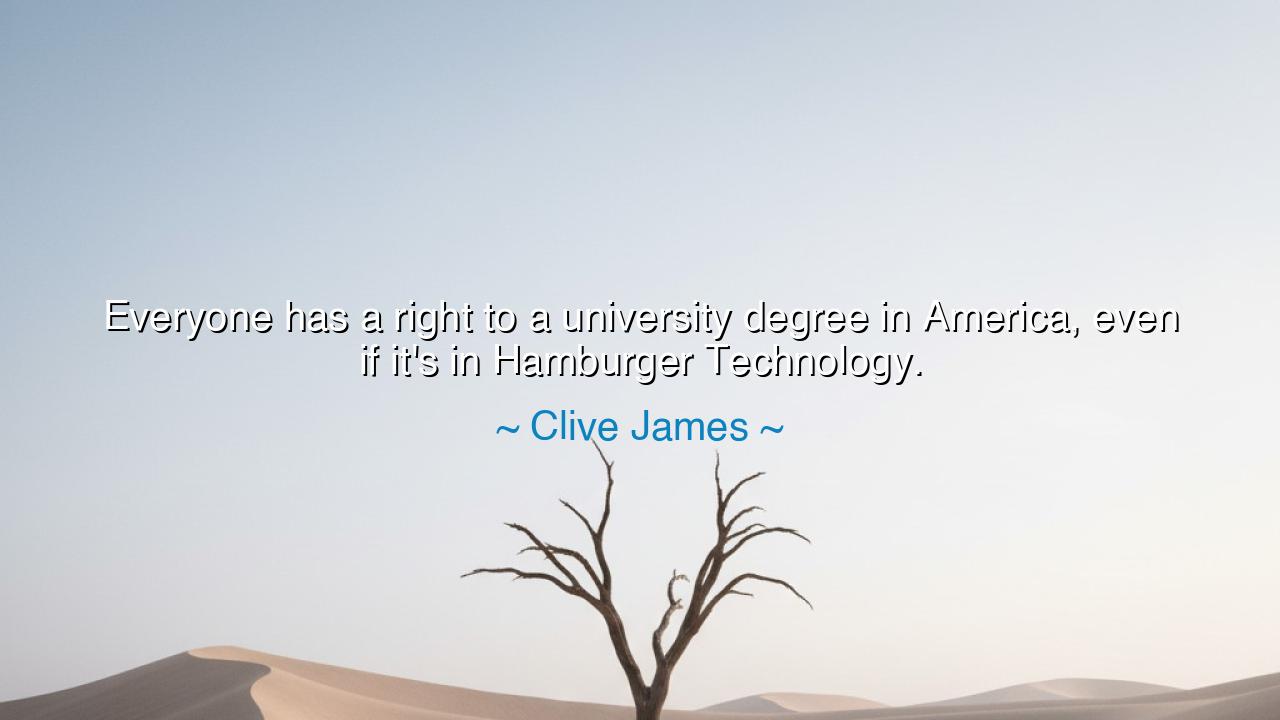
Everyone has a right to a university degree in America, even if
Everyone has a right to a university degree in America, even if it's in Hamburger Technology.






The words “Everyone has a right to a university degree in America, even if it’s in Hamburger Technology” by Clive James glimmer with wit, yet beneath their humor lies a sharp critique of modern society’s idea of education and achievement. James, known for his incisive satire and moral intelligence, used this phrase not merely to mock but to awaken reflection on what knowledge truly means. He saw a world where education, once a sacred pursuit of truth and virtue, was becoming an ornament—granted freely and sometimes meaninglessly, detached from wisdom and depth. His tone is playful, yet behind the laughter stands a philosopher warning that when learning loses its purpose, civilization loses its roots.
In the style of the ancients, let us look beyond the jest and see the mirror it holds before us. Once, the Greeks built academies to mold character and sharpen the soul; their goal was not employment, but enlightenment. Yet Clive James saw a modern world where degrees multiplied like coins from a mint, and where the hunger for titles began to outgrow the hunger for truth. His phrase “Hamburger Technology” is a symbol—an image of mass production applied to knowledge, of learning that feeds the body of the economy but not the spirit of the mind. It is the fast food of intellect: accessible, quick, satisfying for a moment—but lacking in nourishment for the soul.
To understand this truth more deeply, recall the story of Socrates, who never held a title nor sought one. In his time, Athens overflowed with sophists—teachers who sold knowledge as a commodity, much like universities today sell degrees. Socrates, poor and barefoot, stood against this flood of superficial wisdom. He taught that to know oneself was greater than to display credentials. In this, he resembles Clive James’s lament—that education without reflection becomes vanity, and that a degree without virtue is but a polished shell without a pearl inside.
The modern age offers its own examples. Consider the young student who graduates with honors yet cannot bear hardship, cannot think beyond the script of his lectures. He possesses a degree, yes—but has he gained wisdom? Contrast this with the humble craftsman or the farmer who, though unlettered, knows patience, balance, and gratitude. Here lies the paradox James unveils: education, when stripped of soul, is less noble than work done with sincerity. The truest degree is not written on parchment—it is carved in the character.
Still, James’s humor hides not disdain but compassion. He does not condemn the student of “Hamburger Technology,” for he knows that every person deserves access to learning. His irony points not at the student but at the system that confuses abundance with excellence. When every man may earn a degree, it is good and just—but when the meaning of that degree fades, the temple of learning becomes a marketplace. His jest reminds us to preserve the sanctity of knowledge, to guard education from becoming a mass product of pride and profit.
So, dear listener, what lesson shall we draw? Seek learning that feeds the spirit, not just the résumé. Let your education, whether from school or from life, refine your heart as much as your intellect. If you study “Hamburger Technology,” then study it with reverence—make the simple act of craft a work of mastery, of beauty, of meaning. For greatness lies not in what one studies, but in how one learns: with humility, with depth, with love for truth.
And thus, the old wisdom stands: Knowledge without virtue is emptiness, but even the smallest skill, practiced with devotion, becomes noble. Let Clive James’s jest ring in your ears not as mockery but as a reminder—to never mistake the diploma for the education, nor the title for the understanding. For in the end, it is not the degree that dignifies the soul, but the soul that dignifies the degree.






AAdministratorAdministrator
Welcome, honored guests. Please leave a comment, we will respond soon